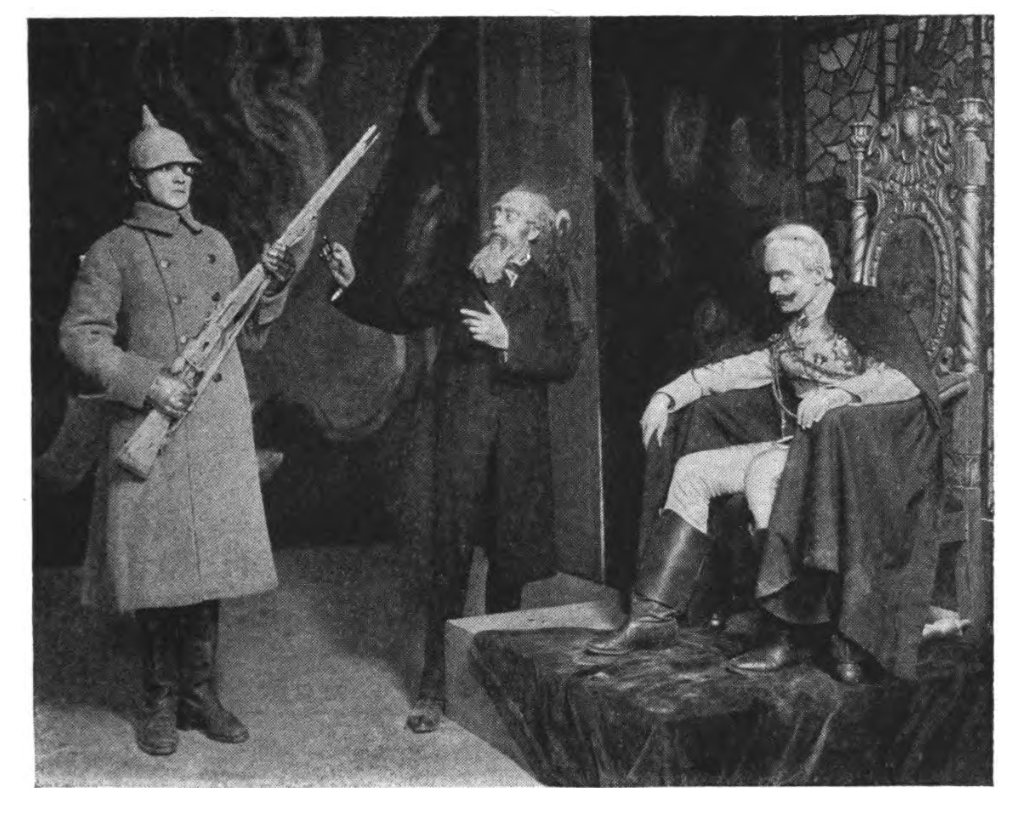BLOOD AND IRON (5)
By:
December 9, 2023

“Blood and Iron: A Play in One Act,” A Radium Age proto-sf ancestor of The Six Million Dollar Man and RoboCop, was first published in the December 1917 issue of The Strand. (Note that the play predates Karel Čapek’s “R.U.R.: Rossum’s Universal Robots” by four years.) HiLoBooks is pleased to serialize it here for HILOBROW’s readers.
ALL INSTALLMENTS: 1 | 2 | 3 | 4 | 5 | 6 | 7 | 8.
SCIENTIST (Recalling an important detail.): And moreover, your Majesty, there is this aspect to be considered. We are manufacturing human extremities on a standard, interchangeable basis. For example, as your Majesty perceives, this left leg — (picks up ruler from desk and raps left leg of 241, which gives out metallic ring), is metal. As is also his left forearm, including the elbow. (Taps it.) And both hands. (Taps them also. 241 receives these attentions stoically as each member of his body clangs in a different note.) Furthermore, your gracious Majesty, if any or all of these parts are shattered in the course of battle, our corps of trained mechanicians, ever at hand, supplies the parts by numbers, and the fighting unit embodied in the individual returns with but little loss of time and the minimum of inconvenience to your Majesty’s service.
EMPEROR: What does he weigh?
SCIENTIST: Equipped? (EMPEROR nods.) One hundred and seventy-five pounds.
EMPEROR: And without his equipment?
SCIENTIST: One hundred and five.
EMPEROR (Brushing his hand across his forehead.) Little more than half a man.
SCIENTIST: True, your Majesty. And therefore requires but half the rations, half the care of a whole unit. There is that much less to nourish.
EMPEROR: You have brought about the greatest advance in the history of civilisation. Tell me, what else of the telescopic eye? That interests me. I shall be surprised at nothing. Your achievements baffle.
SCIENTIST: The telescopic eye, your Majesty — (SCIENTIST circles the left eye of 241 with his finger) is superior to the human eye in two important characteristics. First, it possesses the telescopic quality as you have observed; and, second, its power is undiminished by darkness.
EMPEROR (With incredibility.): You mean he can see in the dark?
SCIENTIST: Just that. And moreover, your Majesty —
EMPEROR: Halt! This is very interesting. We will test that also. Demonstrate.
SCIENTIST (Dubiously.): Does your Majesty object to darkness?
EMPEROR (Hesitates; then replies with an effort.): No. The electric switch is there (points to white button on the table).
SCIENTIST (To 241.): Right about face! Give attention to His Majesty! (SCIENTIST crosses to table and lays his finger beside the button. 241 observes the whole transaction carefully.) (To EMPEROR.) I will switch off the light. Be so kind as to perform any act you may, and he will describe your movements. Are you ready?
RADIUM AGE PROTO-SF: “Radium Age” is Josh Glenn’s name for the nascent sf genre’s c. 1900–1935 era, a period which saw the discovery of radioactivity, i.e., the revelation that matter itself is constantly in movement — a fitting metaphor for the first decades of the 20th century, during which old scientific, religious, political, and social certainties were shattered. More info here.
SERIALIZED BY HILOBOOKS: James Parker’s Cocky the Fox | Annalee Newitz’s “The Great Oxygen Race” | Matthew Battles’s “Imago” | & many more original and reissued novels and stories.
